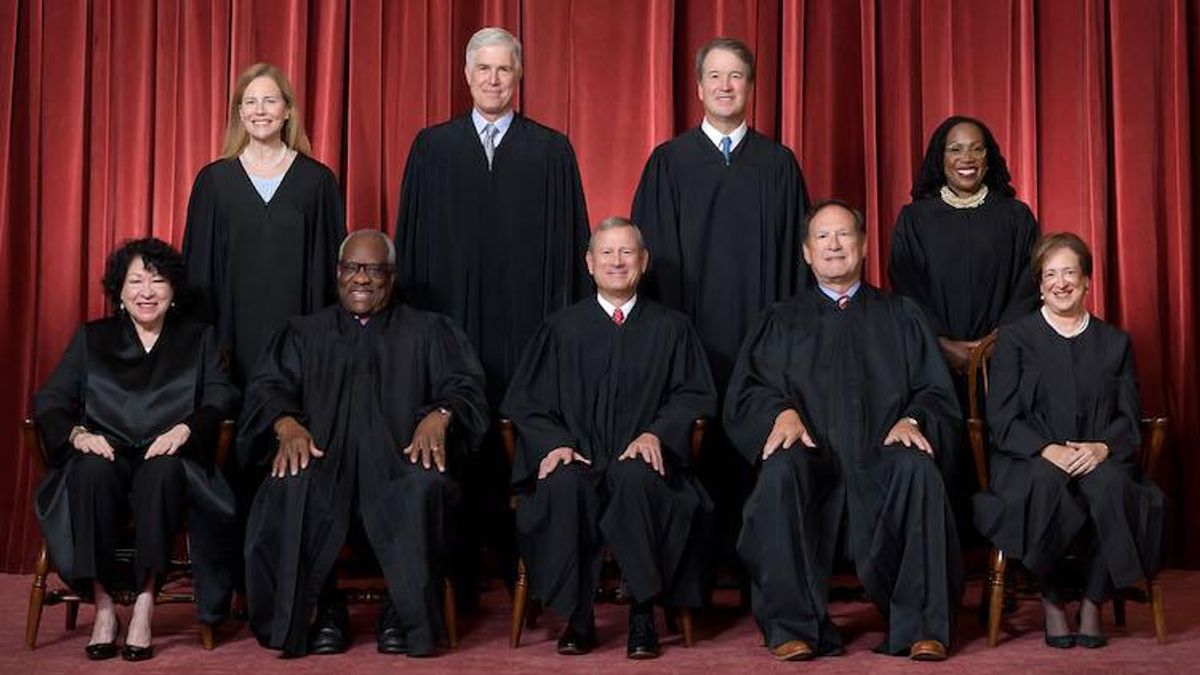LGBTQ+ rights advocates are expressing concern about a Supreme Court decision that blocked the enforcement of a new rule from the Biden administration protecting transgender students from discrimination in education.
The court Friday denied the administration’s request to enforce the rule while the appeals process continues for 10 states that have sued. The rule has several provisions protecting trans people; the administration had sought to be able to enforce most of the provisions, including one saying that sex discrimination includes discrimination based on gender identity. Title IX of the Education Amendments of 1972 bans sex discrimination in any educational program that receives federal funds.
Six states had challenged the rule in a case filed in Kentucky, and four states did so in one filed in Louisiana. The Department of Education issued the rule in April, and in June, two federal courts issued injunctions against its enforcement while the lawsuits play out. Appeals courts then rejected the Education Department’s request to be allowed to enforce the rule, so the department, represented by the U.S. solicitor general, appealed to the Supreme Court.
The states in the two suits argued that they were injured by the new definition of sex discrimination as well as two other provisions — one saying schools could not bar trans people from the restrooms and locker rooms consistent with their gender identity and another defining a hostile environment as one that includes harassment based on gender identity. But the district and appeals courts blocked enforcement of the entire rule, including sections that had nothing to do with anti-transgender discrimination.
The Department of Education had asked to be allowed to enforce the whole rule, minus the provisions on sex-segregated spaces and hostile environments but including the definition of sex discrimination. U.S. Solicitor General Elizabeth Prelogar “emphasized that the 2024 rule is an ‘omnibus’ regulation that addresses a wide range of issues, unrelated to discrimination against transgender people, that the states have not challenged,” SCOTUSBlogreports. “Moreover, she added, when it issued the rule, the Department of Education intended each provision to stand alone. The district courts’ orders blocking the enforcement of the entire rule, she contended, therefore sweep too broadly to block ‘dozens of provisions that’ were not before the courts. Such a ‘blunderbuss approach to preliminary relief,’ she maintained, is ‘both wrong and consequential.’”
But five of the court’s conservative justices agreed with the lower courts’ findings that “the new definition of sex discrimination is intertwined with and affects many other provisions of the new rule” and therefore the entire rule should remain blocked, the majority ruling states. It also notes the difficulty in figuring out how to apply the rule temporarily and says the states are likely to succeed in their challenges. The justices joining in the ruling are Brett Kavanaugh, Clarence Thomas, Amy Coney Barrett, Samuel Alito, and Chief Justice John Roberts.
The court’s three liberals, Sonia Sotomayor, Elana Kagan, and Ketanji Brown Jackson, dissented in part, and they were joined by conservative Neil Gorsuch. However, they said they would leave the three trans-oriented provisions blocked, because those are the ones that the states said they were harmed by. Blocking the entire rule, they said, is overbroad.
The six states in one suit, Tennessee et al v. Cardona, filed in Kentucky, are Kentucky, Indiana, Ohio, Tennessee, Virginia, and West Virginia. Cardona is Secretary of Education Miguel Cardona. The other, Louisiana et al v. Department of Education, includes Louisiana, Mississippi, Montana, and Idaho.
Ian Millhiser, writing in Vox,called the ruling an “odd opinion ... that seemed to abandon [the court’s] landmark civil rights decision in Bostock v. Clayton County,” the 2020 ruling in which the court found that sex discrimination includes discrimination based on sexual orientation or gender identity. That ruling applied to employment, as governed by Title VII of the Civil Rights Act of 1964, but on the first day of his tenure, President Joe Biden announced his intention to apply the principles of Bostock across the federal government.
The court had a somewhat different makeup in 2020, but Kavanaugh and Gorsuch were already members, and Gorsuch authored the Bostock ruling. Roberts joined Gorsuch and the court’s liberals — then Ruth Bader Ginsburg, Stephen Breyer, Kagan, and Sotomayor — in the 6-3 decision. Kavanaugh, Alito, and Thomas dissented.
The ruling in the Title IX cases “is an enigma,” Millhiser wrote. “The justices aren’t telling us why they refused to follow Bostock. But, regardless of their reasons, the Court’s decision not to follow this landmark civil rights decision is an ominous sign for all victims of anti-LGBTQ discrimination.”
Legal scholar Steve Vladek, writing on his One Firstblog, termed the decision “a huge mess.” He explained, “The entire rule remains blocked in the 10 states who were before the Supreme Court. Other injunctions against specific provisions remain in effect in another 16 states; the Rule is otherwise in effect in its entirety almost everywhere else. If this sounds like an enormous headache, it is.”
“Now we have at least three different sets of rules,” he continued. “And as the dissent (quite rightly) points out, ‘Individuals in the respondent states will be deprived of guidance related to their rights under Title IX, of updates to the processes schools must follow in investigating their complaints of sex discrimination, of protections from retaliation should they file a complaint, and of much more.’”



















































































